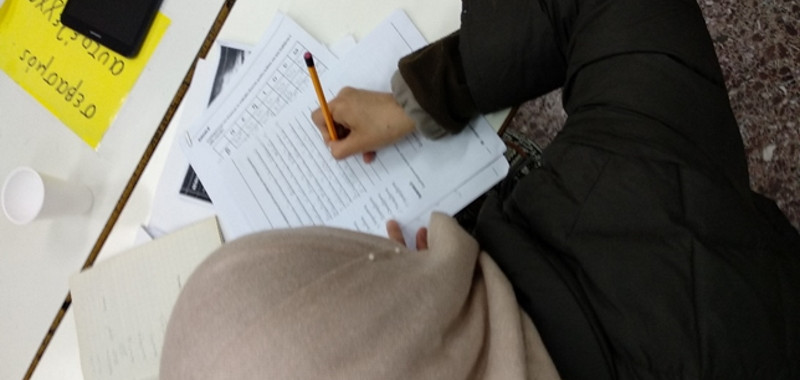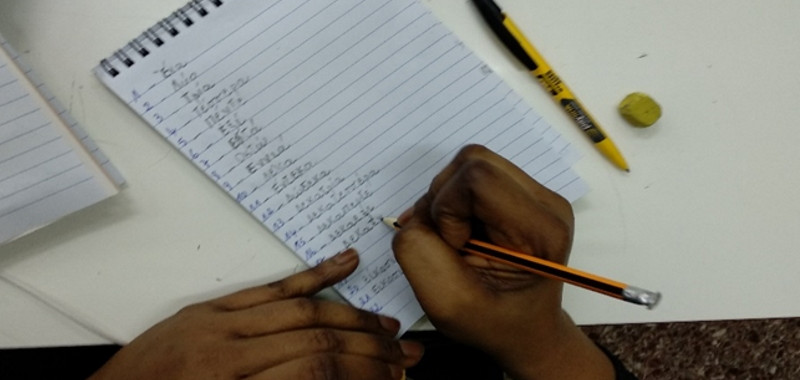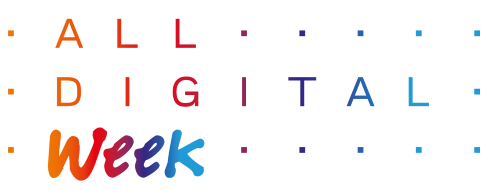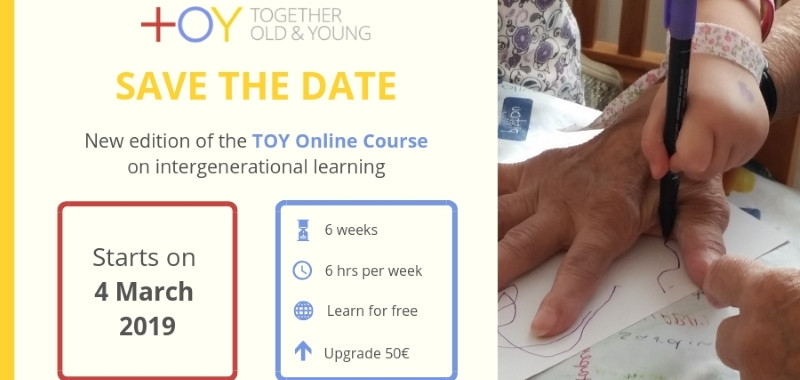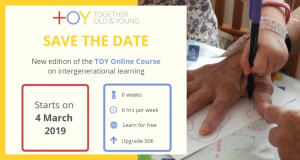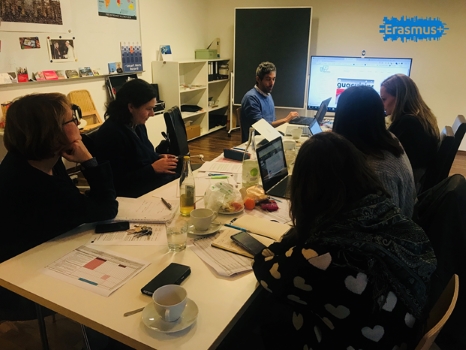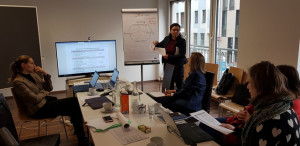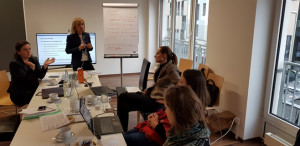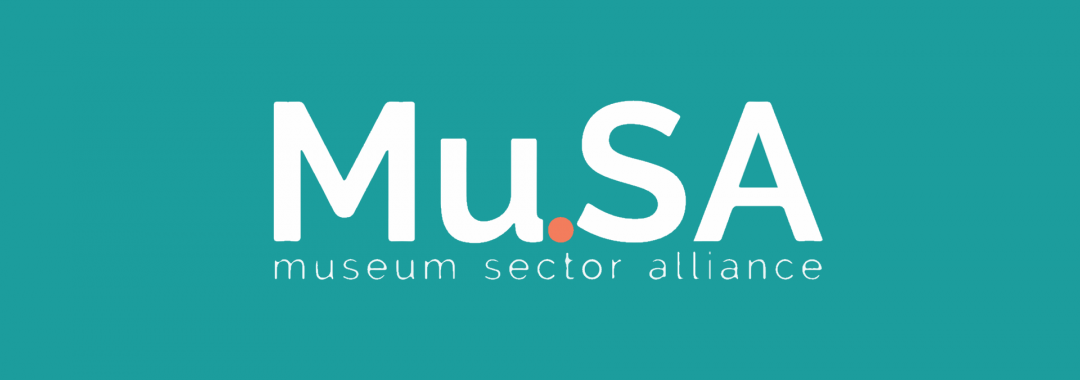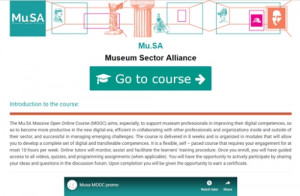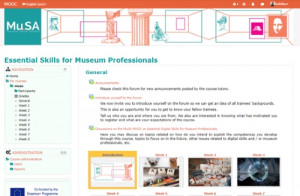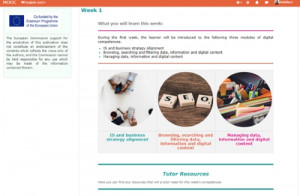WEMIN – MRW story, “Bahar” from Afganistan
The story of “Bahar” from Afganistan
“My goal is to create a very good work portfolio so as to apply for a student visa in Canada. I want to continue my studies in fashion design”
“Bahar” was born in Afghanistan but she had to leave the country when she was 6 months old. She lived most of her life in Iran and in exile. She is 24 years old and comes from a big family. She came in Greece in 2017, almost one and a half years ago. After a short stay in a Greek island’s hotspot, she came in Athens where she struggles to make her dreams come true.
“Bahar” is a very dynamic young woman, full of energy and positive thinking. She told me she was the one to convince her parents and family members to leave Iran: “One day I gathered all my family and I told my brothers and sisters: look at our father. If we stay here, we will grow up and be exactly like him. There is no possibility to change our fate. Is this what you want?” Sometimes she feels responsible for all the difficulties they have faced and still facing since they came in Greece, but she does not regret it and hopes for the best: “I like to set goals in my life. Every day I write down one goal. Exactly three years before we left Iran, on the same month, I had written it down in my diary, that on three years from now we will leave.”
 “Bahar” has been trained as a seamstress in Iran, following her mother’s profession and will. Although she didn’t like it in the beginning, her job experience in a well-known designer made her change her attitude. Realizing her talent and skills, she decided to attend a school for fashion design. It was not an easy decision, since in order for her to find the money to pay the fees, she had to persuade her previous boss to give her a loan. Her boss loaned her the money but to assure that “Bahar” would pay her back, she kept her passport. Until today, she hasn’t taken it back.
“Bahar” has been trained as a seamstress in Iran, following her mother’s profession and will. Although she didn’t like it in the beginning, her job experience in a well-known designer made her change her attitude. Realizing her talent and skills, she decided to attend a school for fashion design. It was not an easy decision, since in order for her to find the money to pay the fees, she had to persuade her previous boss to give her a loan. Her boss loaned her the money but to assure that “Bahar” would pay her back, she kept her passport. Until today, she hasn’t taken it back.
Her last job in Iran was in a local clothes industry. She was designing and cutting patterns. Asking her what are her favorite colors, she replies: “I like green and red, but when I design I usually use grey, black, blue black. This kind of colors. I don’t know why”. She shows me some of her designs. Very beautiful, original and of a modern aesthetics. A black long dress with a colorful embroidery in the front, drew my attention. “Bahar” explained that it is a typical traditional embroidery of her country.
During the last period, “Bahar” has been working in a Greek dressmaker’s lab. Although “Bahar“ does not speak Greek and her employer does not speak English, they manage to cooperate. However, “Bahar” states that she is not treating her in a good manner and that she makes her work too much: “She all the time tells me do this, do that, and speaks me in a bad manner. I am a human too, I can’t stand it. I am just staying because I am in need of the money.” In parallel, “Bahar” is working tirelessly to make her dream come true, that is to put on a fashion show in Greece with her own designed clothes. She keeps designing and trying to find a place for the show and to gather money to buy the garments needed to make the clothes. She is very optimistic and while being in Greece she has met different people who are willing to help her. When I ask her why she wants to hold this fashion show and what is her ultimate goal, she replies: “My goal is to create a very good work portfolio so as to apply for a student visa in Canada. I want to continue my studies in fashion design. I never had the chance to study. In Iran I didn’t have the right because I was from Afghanistan. I want to go to the university. I like reading and learning and I always read.”
Being a very sociable person, who enjoys meeting new people, the hardest thing for “Bahar” in the beginning was not being able to communicate because of the language gap. She does not yet speak Greek but WEMIN’s courses have helped her start reading. However, after coming in Greece she has learned English quite well and she can in that way communicate with people from different nationalities.
You can be informed about WEMIN implementation, by visiting www.wemin-project.eu
For further information, please contact info@daissy.eap.gr and olykek@olympiakokek.gr
WEMIN – MRW story, “Hamia” from Algeria
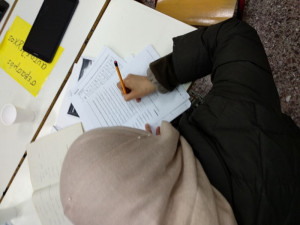 Hamia is from Algeria. She is 40 years old, married with five children. She came in Greece in 2017, almost one and a half years ago, and her last child was born in Greece.
Hamia is from Algeria. She is 40 years old, married with five children. She came in Greece in 2017, almost one and a half years ago, and her last child was born in Greece.
She has completed journalism studies in Algeria and she has done many different jobs such as seamstress and teacher of Arabic and French languages to children. She didn’t wish to speak about the last job she performed before leaving her country.
The trip from Algeria to Greece was especially difficult for Hamia, since she was pregnant and her health condition had worsened. When I asked her about the things she has brought with her from her country of origin, she replied: “The last night before I leave my country, my mother had given me golden jewels as a gift and also my sister’s family had all given me something as a present, but it all got stolen during the journey. It was like a jungle. We were walking up to 10 hours in the dark. It was very difficult. We lost all our things.”
The first period in Greece was also very tough for Hamia: “It was difficult here, very difficult. I could not eat, the food had a bad smell and the living conditions in the island within a tent were very difficult. I was feeling very bad. Every day I felt tired, I felt sick. During the pregnancy all vitamin levels were very low. Because of that, the delivery of the baby was very difficult. It felt like I was giving birth for the first time. I believed I would die. Hopefully, the doctor could speak French, and the nurse, too, and this helped a lot.”
After seven months in a Greek island, Hamia and her family came to Athens. She immediately got into hospital. “I can’t remember anything from this first period. I was only going to the hospital and then back home.”
Nowdays, Hamia’ s health is improved and her everyday life is rather getting into normal: “In the building where we are staying with my family there isn’t anybody who speaks Arabic. But in the flat opposite ours, there is a lady speaking French, living there with her family. And we greet each other, and they are all very nice to us…In the neighborhood I visit the supermarket and the children’s school. They go to Greek school and they have learnt the language. When I speak to them, they tell me, ‘you don’t speak Greek, go and learn and then come and speak with us.’ I need to learn the language for the children. To help them in school, to read with them the books they get taught in school. I can now slowly read the words, but I do not yet understand what I am reading, the meaning of them.”
Asking her about her dreams for the future, Hamia says: “The only thing I want is to work. To rely on myself. To be able to rely on ourselves… I miss working. Ok, as a teacher I can’t work. Because since children here speak Greek I have to first learn Greek. But, I can work for example in a small sewing industry, since I know this job very well …Greece is the country we intend to live. We had decided it from the very beginning. We left our country just to have freedom. Here we have found it. Our children go to school here and if we also find a job, we have no reason of wanting to change country.”
You can be informed about WEMIN implementation, by visiting www.wemin-project.eu
For further information, please contact info@daissy.eap.gr and olykek@olympiakokek.gr
WEMIN – MRW story, “Marie” from Cameroon
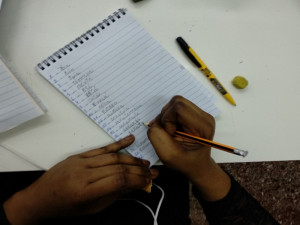 The story of “Marie” from Cameroon
The story of “Marie” from Cameroon
“….if you are in a place that you feel secure and you are not afraid that somebody is going to kill you, you hope that one day you will have a family again … “
Marie is 32 years old and she is from Cameroon. She has studied marketing and she has been working as a teacher in her country, teaching French to small children. Being in serious danger, she left Cameroon in 2017.
Marie paid a lot of money to a man for helping her with her trip. When she arrived in Istanbul, Turkey, he introduced her to a woman who promised to help her to issue a residence permit. Instead, she got Marie into prostitution and kept all her documents.
“After this man left me, the woman told me this is the place you will stay and the place you can work. Work, which work, I said? You will see, she said, if you need residence you have obligation to do that. Do what? Sleep with men…This woman did me a lot of harm, also beating me, and torturing me in very bad ways. In the morning this place was normal and good, but in the night many men came. What this woman made me, I won’t understand it in my whole life. I didn’t eat, I was only crying all day..”
Marie had been suffering this situation for six months, until one day she met a girl who helped her escape from this woman’s house. “I told her I want to go to the police. She told me this was not a good idea, since I did not have any papers. Turkish don’t know of human rights. If you go and accuse this woman, maybe she puts somebody to kill you. The only option you have is to run for Izmir, and from there to Greece.” Marie was despaired and thought of returning to Cameroon, but fortunately this girl paid for all her transportation expenses and Marie arrived safe to Izmir. There she worked for almost a month in a garment business, so as to gain some money to pay for her trip to Greece. Along with thirty more persons, she crossed the Aegean sea in a boat, wearing no life jacket since she didn’t have enough money to pay the trafficker for it.
However, she managed to arrive safe in a Greek island and then reached Athens.
“…When you have faced too many problems, you think now they are finished. I believed again that God exists, that he picked me and brought me to a paradise that I will not be in danger of being killed again….I am alone here and I have nothing, but if you are in a place that you feel secure and you are not afraid that somebody is going to kill you, you hope that one day you will have a family again. You see, when I come to school and I see all of you I am happy. I cannot stay in my house. To make what? I am happy of learning Greek. Because I want to speak. I want to be very important for this country. My intention is to work. I went in a hotel to work, where they were asking for English and Greek. The man there told me that if I learn to speak Greek everything will go well and I will find a job. So, this gave me power again to learn…I want to be useful for this country. I cannot be useful if I do not speak Greek. It is my obligation to learn it and to come here every time. Each day I come here I have one objective: to learn one sentence. This gives me power. When I don’t come to school I feel like sick, I am missing it. Even if I can’t come from the beginning, even if I am sometimes late, I want to come. I live together with six girls in an apartment. They all have documents, but they don’t go to school to learn Greek. Me, I have no documents but I come. Not just now, I started learning Greek since I was in the island. From 8.30 o’ clock in the morning I attend different kind of courses here in Greece. When I get back home at night I say, ok God, everything went well today, I take my shower and I relax ….”
You can be informed about WEMIN implementation, by visiting www.wemin-project.eu
For further information, please contact info@daissy.eap.gr and olykek@olympiakokek.gr
Η ερευνητική ομάδα DAISSy διοργανώτρια της All Digital Week 2019 στην Ελλάδα!
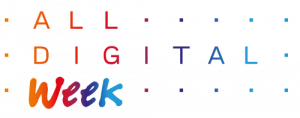 Με το σύνθημα “Ψηφιακές Δεξιότητες για Όλους” η ερευνητική ομάδα DAISSy του Ελληνικού Ανοικτού Πανεπιστημίου συνεργάζεται με φορείς από όλη την Ελλάδα για την προσφορά εκπαιδευτικών δράσεων από 25 Μαρτίου έως 7 Απριλίου 2019. Οι δράσεις στόχο έχουν να προωθήσουν την ιδέα ότι η ανάπτυξη ψηφιακών δεξιοτήτων είναι προς όφελος του ευρύτερου κοινωνικού συνόλου. Η προσπάθεια αυτή εντάσσεται στην πανευρωπαϊκή εκπαιδευτική εκστρατεία All Digital Week που λαμβάνει χώρα από το 2010, κατά τη διάρκεια της οποίας σχολεία, πανεπιστήμια, βιβλιοθήκες και μη κερδοσκοπικές οργανώσεις προσφέρουν κάθε χρόνο σε 100.000 Ευρωπαίους πολίτες δραστηριότητες με αντικείμενο τον ψηφιακό μετασχηματισμό και τα αποτελέσματά του. Η συμμετοχή σε όλες τις δραστηριότητες είναι δωρεάν. Το πρόγραμμα των εκδηλώσεων ενημερώνεται διαρκώς και είναι διαθέσιμο στο https://alldigitalweek.eu/events/.
Με το σύνθημα “Ψηφιακές Δεξιότητες για Όλους” η ερευνητική ομάδα DAISSy του Ελληνικού Ανοικτού Πανεπιστημίου συνεργάζεται με φορείς από όλη την Ελλάδα για την προσφορά εκπαιδευτικών δράσεων από 25 Μαρτίου έως 7 Απριλίου 2019. Οι δράσεις στόχο έχουν να προωθήσουν την ιδέα ότι η ανάπτυξη ψηφιακών δεξιοτήτων είναι προς όφελος του ευρύτερου κοινωνικού συνόλου. Η προσπάθεια αυτή εντάσσεται στην πανευρωπαϊκή εκπαιδευτική εκστρατεία All Digital Week που λαμβάνει χώρα από το 2010, κατά τη διάρκεια της οποίας σχολεία, πανεπιστήμια, βιβλιοθήκες και μη κερδοσκοπικές οργανώσεις προσφέρουν κάθε χρόνο σε 100.000 Ευρωπαίους πολίτες δραστηριότητες με αντικείμενο τον ψηφιακό μετασχηματισμό και τα αποτελέσματά του. Η συμμετοχή σε όλες τις δραστηριότητες είναι δωρεάν. Το πρόγραμμα των εκδηλώσεων ενημερώνεται διαρκώς και είναι διαθέσιμο στο https://alldigitalweek.eu/events/.
Η εκστρατεία All Digital Week στόχο έχει να ευαισθητοποιήσει τους Ευρωπαίους πολίτες ώστε να συμμετάσχουν ενεργά στον ψηφιακό μετασχηματισμό, δηλαδή την καινοφανή χρήση της ψηφιακής τεχνολογίας για την επίλυση παραδοσιακών προβλημάτων, προκειμένου να επωφεληθούν από αυτόν. Είναι γεγονός ότι η σχετική ανάγκη σε όλη την Ευρώπη είναι πολύ μεγάλη. Οι αριθμοί μιλούν από μόνοι τους:
- Το 43% των Ευρωπαίων πολιτών στερούνται βασικών ψηφιακών δεξιοτήτων.
- Το 35% του εργατικού δυναμικού στην Ευρώπη έχει ανεπαρκές επίπεδο ψηφιακών δεξιοτήτων.
- Το 17% των Ευρωπαίων πολιτών δεν έχει ποτέ χρησιμοποιήσει το Internet.
- Το 49% των Ευρωπαίων πολιτών δεν έχει χρησιμοποιήσει ποτέ το διαδίκτυο για να διασταυρώσει πληροφορίες και ειδήσεις.
- Το 72% του εργατικού δυναμικού στην Ευρώπη πιστεύει ότι τα ρομπότ θα καταλάβουν τις θέσεις εργασίας τους.
Ο Ευρωπαίος Επίτροπος για την Εκπαίδευση, το Πολιτισμό, τη Νεολαία και τον Αθλητισμό, κύριος Tibor Navracsics, δήλωσε σχετικά: “Στη σημερινή κοινωνία, για να θεωρηθεί κάποιος εγγράμματος, θα πρέπει να έχει αναπτύξει ψηφιακές δεξιότητες με ολοκληρωμένο τρόπο. Η έλλειψη ψηφιακών δεξιοτήτων ισοδυναμεί με κοινωνικό αποκλεισμό, η ανάπτυξή τους αποτελεί ισχυρή συνιστώσα ισότιμης συμμετοχής στο κοινωνικό γίγνεσθαι”.
Massive Open Online Course for Intergenerational Learning
 The Massive Open Online Course (MOOC) “Together Old and Young: An Intergenerational Approach” is one of the main outputs of the Erasmus+ project TOY PLUS: Together Old and Young – Practitioners Learning and Upscaling Skills that started on the 1st of November 2016 and finished on the 31st October 2018.
The Massive Open Online Course (MOOC) “Together Old and Young: An Intergenerational Approach” is one of the main outputs of the Erasmus+ project TOY PLUS: Together Old and Young – Practitioners Learning and Upscaling Skills that started on the 1st of November 2016 and finished on the 31st October 2018.
The online course addresses intergenerational learning issues, especially focusing on the age groups of young children from 0-8 years old and older people in the age of retirement. It can help anyone who wishes to participate in continuing professional development opportunities in intergenerational learning and discover practical ways to create good quality and sustainable intergenerational learning activities.
The online course is relevant for early childhood education and care practitioners, primary school teachers (working with 4 to 8 year-olds), social care practitioners working with older adults, community development workers i.e. practitioners and volunteers working in community groups such as those linked to community social and cultural centres, sports clubs, scouting or religious institutions, practitioners and volunteers working in libraries and museums, educational specialists in non-formal learning, etc.
Up until now, the online course has run twice and has successfully trained more than 150 adult learners from Europe and around the world. The online course is free of charge and will be available again, on the 4th March 2019. Registrations are open until Sunday, 3rd March 2019.
The MOOC platform has been developed and is supported by the DAISSy Group from Hellenic Open University, whereas the educational material has been developed by the experts in intergenerational learning, that is the Dublin Institute of Technology, the Beth Johnson Foundation/Linking Generations Northern Ireland and the International Child Development Initiatives.
Mu.SA MOOC as good practice example in the EPALE community
 The project “Mu.SA: Museum Sector Alliance” (ongoing project) is approved in the European Framework of Erasmus+ / Sector Skills Alliances. It aims to address the increasing disconnection between formal education and training and the world of work because of the emergence of new job roles due to the quickening pace of the adoption of ICT in the museum sector. Mu.SA addresses directly the shortage of digital and transferable skills identified in the museum sector.
The project “Mu.SA: Museum Sector Alliance” (ongoing project) is approved in the European Framework of Erasmus+ / Sector Skills Alliances. It aims to address the increasing disconnection between formal education and training and the world of work because of the emergence of new job roles due to the quickening pace of the adoption of ICT in the museum sector. Mu.SA addresses directly the shortage of digital and transferable skills identified in the museum sector.
The partnership consists of eleven partners from four Countries: Hellas, Italy, Portugal and Belgium with coordinator the Hellenic Open University – DAISSy Research Group, Hellas.
Mu.SA – Museum Sector Alliance project opens a series of online and offline learning opportunities to develop essential digital skills for museum professionals.
The online course “Essential Digital Skills for Museum Professionals” (MOOC) is especially designed for the museum community, both for professionals as well as students, volunteers or unemployed, who want to pursue their future career in the museum sector. The aim is to support these groups to improve their digital competences and apply them in their daily work at the museums.
The Mu.SA MOOC is a flexible, self-paced course that requires learner’s engagement for at most 10 hours per week. The course is organized in modules that allows students to develop a complete set of digital and transferable competences required for the museum sector.
The MOOC aims at enhancing the digital skills and 21st century skills of museum and cultural professionals. It consists of training modules based on the European e-competences framework (e-CF), DigComp and P21 – the course is a unique combination of these standards, and for this reason it is considered as best practice at European level. The instructional design was based on learning outcomes and is modular in order to allow each trainee to study based on his / her pace and availability.
The MOOC extends to 8 weeks of training and requires a total of 80 hours of training and study. Each week, it focuses on 1 e-CF competence (a European standard of IT skills) and combines competences from DigComp (the global standard of digital literacy of the average citizen) and P21 (a 21st century skill model) frameworks. For each competence, a separate training module has been designed, the material of which is grouped in units. Each unit includes presentations, videos and study material related to a set of learning outcomes that are assessed at the end.
Online tutors monitor, assist and facilitate learners’ training procedure. Once enrolled, students have guided access to all videos, quizzes, and assignments. The course is designed as to facilitate active participation, peer-learning and open discussion among the course participants.
The training platform was developed by the DAISSy team of HOU.
After the completion of this course, learners will be able to develop and use digital and transferable competences necessary for professionals working in the museum sector.
Beyond the ability to develop digital strategy, digital content or use digital tools and platforms, students will also advance skills like time management, communication, team-working, leadership and creative thinking.
The course is free and open for all, already running since the 7th of January 2019! The main language of the training is English and videos are subtitled in Greek, Italian and Portuguese.
Up to now, more than 5,200 people have registered in the course from all around the world!
Learners who will complete the MOOC and succeed in at least 80% of graded activities are eligible to continue their learning journey by applying for an advanced, six-month specialization course. Selected students can choose focused trainings in one of the emerging job profiles: Digital Strategy Manager, Digital Collections Curator, Digital Interactive Experience Developer and Online Community Manager. Selected group, who has successfully finished both the MOOC and specialization training, will get the work-based learning in one of the European museums.
More information about the MOOC in here and the Mu.SA project in here.
Read the article here!
Εγγραφές ξεκίνησαν για το ΤΟΥ MOOC
Το Μαζικό Ανοικτό Διαδικτυακό Μάθημα (MOOC) του ΤΟΥ διατίθεται για 2η φορά! Η συμμετοχή στο MOOC είναι δωρεάν!
Οι εγγραφές είναι ανοικτές μέσω αυτής της σελίδας.
Στις 4 Μαρτίου 2019 και για 6 εβδομάδες, θα διατεθεί και πάλι το MOOC με αντικείμενο τη Διαγενεακή Μάθηση (Intergenerational Learning), το οποίο αναπτύχθηκε από την ερευνητική ομάδα DAISSy του ΕΑΠ στο πλαίσιο του Ευρωπαϊκού έργου ΤΟΥ+ .
Το MOOC απευθύνεται σε εκπαιδευτικούς, κοινωνικούς λειτουργούς και γενικότερα όσους εργάζονται ή ενδιαφέρονται να εργαστούν με παιδιά και ηλικιωμένους. Περισσότερες πληροφορίες για το MOOC θα βρείτε εδώ
International Conference on “Diversity in Adult Education: Community, Integration, Governance
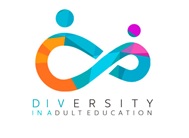 The DAISSy research group of Hellenic Open University (HOU), in collaboration with the National Center for Social Research (EKKE), organized the International Conference on “Diversity in Adult Education: Community, Integration, Governance” on 12 & 13 December 2018 at the Electra Hotel Athena. The conference marked the completion of the transnational European project DIVINA-EDU: Diversity in Adult Education.
The DAISSy research group of Hellenic Open University (HOU), in collaboration with the National Center for Social Research (EKKE), organized the International Conference on “Diversity in Adult Education: Community, Integration, Governance” on 12 & 13 December 2018 at the Electra Hotel Athena. The conference marked the completion of the transnational European project DIVINA-EDU: Diversity in Adult Education.
The Conference first explored the links between understanding and managing diversity in adult education. At a second, but clearly related level, however, the conference sought to unravel this exploration from a monolithic “educational” orientation. Thus, it demonstrated the more general implications that educational and diversity-centered approaches can have on broader issues such as community building, social inclusion, diversity management, etc. You can read more here!
E4W: a project that supports women’s entrepreneurship
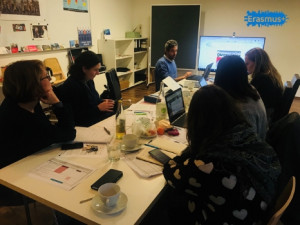 Although women constitute more than 50% of the European population, they have been traditionally underrepresented in the labour market and affected by unemployment more than men. According to Eurostat, at the beginning of 2018, the EU unemployment rate was 8,6% (around 18 mln. people) and half of them have been unemployed for more than one year. However, the share of women among those EU citizens without a job, is more than 50%.
Although women constitute more than 50% of the European population, they have been traditionally underrepresented in the labour market and affected by unemployment more than men. According to Eurostat, at the beginning of 2018, the EU unemployment rate was 8,6% (around 18 mln. people) and half of them have been unemployed for more than one year. However, the share of women among those EU citizens without a job, is more than 50%.
Project Entrepreneurship for Woman (E4W) aims at increasing women’s employability skills. Today problem solving, teamwork, creativity, organization, communication, leadership and digital competences are some of the core skills required by European labour market. The project will develop an entrepreneurship educational pathway for disadvantaged women through a project-based learning approach integrated with ICT in non-formal adult education institutions. During the two years of project lifetime, the course will be tested with the educators of non-formal adult learning organizations and women who would like to improve their project management and ICT skills.
E4W is a Strategic Partnership coordinated Rural Internet Access Points from Lithuania and involving also the DAISSy research group of Computer Technology Institute and Press “Diophantus” from Greece, Simbioza Genesis from Slovenia and Stiftung Digitale Chancen from Germany. The project is funded in the Erasmus+/KA2 programme.
The project kick-off meeting took place in Berlin on December 17-18, 2018. Representatives of the four project partner organizations participated in the meeting that was hosted by SDC. Under the coordination of Laura Grineviciute from RIAP, the project manager, several details regarding execution and coordination of this multinational project were smoothed out and put together.
The first day of the kick-off meeting was dedicated to the presentation of partners’ experience and practice sharing on innovative teaching and learning methods in the fields of entrepreneurship, ICT and project management. The second day was oriented to detailing the activity descriptions of all project work packages, putting emphasis on the instructional strategy, the first project outcome that will be available this May.
Today the launch of the Massive Online Open Course (MOOC) titled Essential skills for museum professionals
Today, January 7, 2019, the MOOC titled Essential skills for museum professionals was launched worldwide. The MOOC was developed by the DAISSy research team of HOU as part of the European Mu.SA project: Museum Sector Alliance in collaboration with the project partners. The Mu.SA project is co-ordinated by Dr. Achilleas Kameas, Professor of Hellenic Open University and is implemented in 4 European countries (Greece, Italy, Portugal, Belgium) by 12 organizations.
The MOOC aims at enhancing the digital skills and 21st century skills of museum and cultural professionals. To this end, it consists of training modules based on the European e-competences framework (e-CF), DigComp and P21 – in fact the course is a unique combination of these standards, and for this reason it is considered as best practice at European level. The instructional design was based on learning outcomes and is modular in order to allow each trainee to study based on his / her pace and availability. The MOOC extends to 8 weeks of training and requires a total of 80 hours of training and study. Each week, it focuses on 1 e-CF competence (a European standard of IT skills) and combines competences from DigComp (the global standard of digital literacy of the average citizen) and P21 (a 21st century skill model) frameworks. For each competence, a separate training module has been designed, the material of which is grouped in units.
Each unit includes presentations, videos and study material related to a set of learning outcomes that are assessed at the end. The training material has been produced in its entirety by the organizations involved in the project and is available in 4 languages: English, Greek, Italian and Portuguese. During the course there will be training support from tutors who have also planned participatory activities to be implemented through forums and social media. The training platform was developed by the DAISSy team of HOU and is available at https://mooc.cti.gr/.
Up to now, more than 5,200 people have registered in the course from all around the world! We hope they will find the course interesting and will persist until they complete it.


